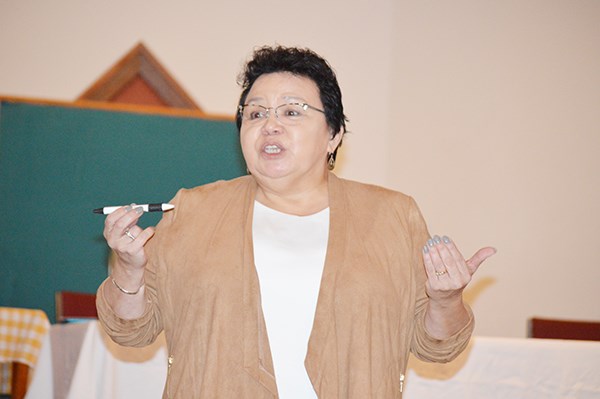Growing up in a small remote Nisga’a community, Sherry Small knew the people around her intimately.
She has brought that same approach to her work with other First Nations people, especially the ones living in the most vulnerable situations.
On Saturday, Small was one of the panelists on homelessness hosted by the Squamish Multifaith Association for its fifth annual Unity and Diversity Dinner, held at St. John the Divine.
Small talked about her work with newly-housed and other vulnerable people in Vancouver with organizations including the Vancouver Aboriginal Friendship Centre.
For her, the key is building connections and emphasizing people over programs.
For her, this meant having to learn unexpected lessons such as how the sound of the heels on her shoes on the floor would evoke painful memories of authority for residential school survivors.
To remind herself of the approaches she needs to take, Small has several messages written on a pen that she can easily glance, which include recognizing everyone has a gift, the need for education to be a way of life and the importance of listening to understand. “As soon as you listen to understand their personal journey, you will know their gift,” she said.
Small views the people with whom she works as participants or members rather than clients. Ultimately, for her, it comes down to knowing how to engage them in the community.
“They’re human, they have a heart and they have a brain,” she said. “And they want trust.”
The panel also included Helping Hands executive director Maureen Mackell and Mayor Patricia Heintzman, who had been involved with Helping Hands before running for council.
Mackell outlined some of the challenges the community is facing when it comes to homelessness, referring to a count in which 152 people were spoken to. Of these, 125 were considered homeless.
She cited other statistics such as the increase in the number of stays at facilities such as Helping Hands’ emergency shelter and Pearl’s Place, a transition house that provides space for women, children and pets leaving abusive situations. At Helping Hands, the number of overnight stays grew from around 3,200 in 2013-14 to around 4,300 in only one year.
Mackell also pointed that there were 18 deaths over a 16-month period among people considered vulnerable starting in 2015.
“Each and every one of these people has a history… has a story,” she said.
Mackell also mentioned ideas such as the Housing First model, which aims to get people into housing before dealing with other questions such as what services they might need.
“We have to get people housed first and foremost,” she said, emphasizing the importance of establishing a sense of community.
The mayor touched on the housing situation and discussed some of the work happening locally to lessen the problem of homelessness and housing in general. She referred to the history of Helping Hands and the district’s emergency measures such as providing space in a former firehall.
Heintzman mentioned initiatives such as seed money in the district’s affordable housing fund as well as plans for a community hub facility downtown that would include emergency services, but also space to create a sense of community, especially for the most vulnerable people living in Squamish.
“We could end homelessness in Squamish,” she said. “It’s not an unachievable goal.”
The group collected donations at the door to for the Squamish Helping Hands Society.



